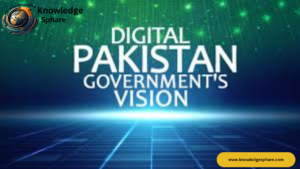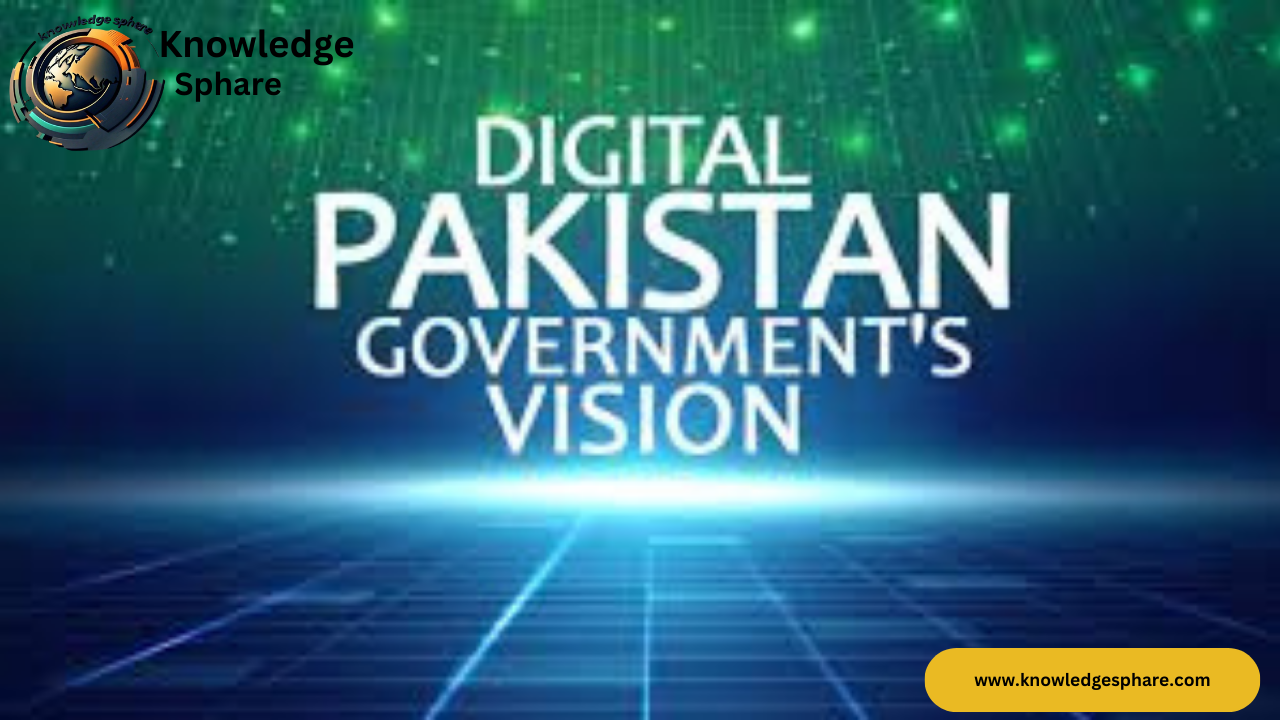Pakistan’s Digital Transformation: Challenges and Opportunities
Pakistan’s Digital Transformation: Challenges and Opportunities Pakistan is at a pivotal point in its journey towards digital transformation. As the country navigates through the digital age, it faces numerous challenges but also a plethora of opportunities. In this article, we’ll explore the landscape of digital transformation in Pakistan, delving into the obstacles and the potential that lie ahead.

Outline
- Introduction to Digital Transformation
- Definition and Importance
- Global Context
-
Introduction to Digital Transformation
Digital transformation refers to the integration of digital technology into all areas of business and society, fundamentally changing how we operate and deliver value. It’s not just about technology; it’s about revamping processes, enhancing customer experiences, and creating new business models. In the global context, digital transformation is a driving force behind the modern economy, fostering innovation, efficiency, and connectivity.
- Pakistan’s Digital Landscape
- Current State of Digital Infrastructure
- Internet Penetration Rates
- Key Players in the Industry
-
Pakistan’s Digital Landscape
Current State of Digital Infrastructure
Pakistan’s digital infrastructure is a mix of progress and challenges. With an increasing number of internet users, the country is gradually building a foundation for digital growth. As of 2024, around 106 million people in Pakistan are using the internet , but the quality and reach of this infrastructure vary significantly across urban and rural areas.Pakistan’s Digital Transformation: Challenges and Opportunities
Internet Penetration Rates
The internet penetration rate in Pakistan stands at approximately 49% . This figure represents significant growth over the past decade but also highlights a substantial portion of the population still without access. Major urban centers like Karachi, Lahore, and Islamabad boast high connectivity, while remote regions lag behind, underlining a digital divide that needs addressing.Pakistan’s Digital Transformation: Challenges and Opportunities

Pakistan’s Digital Transformation: Challenges and Opportunities Key Players in the Industry
Several key players contribute to Pakistan’s digital landscape, including major telecom companies like PTCL, Jazz, and Telenor. Tech giants such as Google and Facebook are increasingly involved in local initiatives, and numerous startups are emerging as critical drivers of digital innovation.Pakistan’s Digital Transformation: Challenges and Opportunities
- Government Initiatives
- Digital Pakistan Vision
- E-Governance Programs
- Policy Frameworks and Regulations
Government Initiatives
Digital Pakistan Vision
Launched in 2019, the Digital Pakistan Vision aims to make Pakistan a digitally empowered nation. This initiative focuses on infrastructure development, digital skills, and an innovation-friendly ecosystem, with an emphasis on accessibility and inclusivity .Pakistan’s Digital Transformation: Challenges and Opportunities
E-Governance Programs
Pakistan is also investing in e-governance, aiming to streamline public services through technology. Programs like NADRA’s digital ID system and the Citizen’s Portal are steps towards reducing bureaucracy and improving service delivery .Pakistan’s Digital Transformation: Challenges and Opportunities
Policy Frameworks and Regulations
The government has introduced various policies and regulations to support digital growth, including data protection laws and incentives for tech startups. However, regulatory hurdles and inconsistent implementation remain challenges.Pakistan’s Digital Transformation: Challenges and Opportunities
- Challenges in Digital Transformation
- Technological Barriers
- Limited Internet Access
- Outdated Infrastructure
- Economic Challenges
- High Costs of Technology
- Funding Limitations
- Social Barriers
- Digital Literacy
- Cultural Resistance
- Security Concerns
- Cybersecurity Threats
- Data Privacy Issues
- Technological Barriers
Challenges in Digital Transformation

Technological Barriers
Limited Internet Access
Despite growth in internet usage, many rural and remote areas still suffer from limited access. The high cost of broadband services and lack of infrastructure hamper widespread connectivity.Pakistan’s Digital Transformation: Challenges and Opportunities
Outdated Infrastructure
Pakistan’s digital infrastructure, particularly in rural areas, is outdated and inadequate for the demands of modern technology. Upgrading this infrastructure is crucial for supporting digitalPakistan’s Digital Transformation: Challenges and Opportunities transformation.
Economic Challenges
High Costs of Technology
The high cost of acquiring and maintaining technology poses a significant barrier, especially for small businesses and rural communities. This economic challenge limits the ability of many to fully participate in the digital economy.Pakistan’s Digital Transformation: Challenges and Opportunities
Funding Limitations
Funding for digital initiatives is often insufficient. Both the public and private sectors struggle with securing the necessary investments to drive large-scale digital projects.Pakistan’s Digital Transformation: Challenges and Opportunities
Social Barriers
Digital Literacy
A significant portion of the population lacks basic digital skills, limiting their ability to engage with digital platforms and services. Efforts to enhance digital literacy are essential for inclusive digital transformation.
Cultural Resistance
Cultural norms and resistance to change can impede the adoption of digital technologies, particularly in conservative and less-educated segments of the population.
Security Concerns
Cybersecurity Threats
With the increase in digital activities, cybersecurity threats are on the rise. Pakistan needs to enhance its cybersecurity measures to protect sensitive data and maintain trust in digital systems.
Data Privacy Issues
Data privacy remains a concern, with many users wary of how their information is used and protected. Strengthening data protection laws and practices is vital for fostering a secure digital environment.
- Opportunities in Digital Transformation
- Economic Growth
- Job Creation in IT Sector
- Growth of E-commerce
- Social Development
- Education and E-Learning
- Healthtech and Telemedicine
- Technological Advancements
- Adoption of Emerging Technologies
- Innovation in Local Startups
- Economic Growth
Opportunities in Digital Transformation
Economic Growth
Job Creation in IT Sector
Digital transformation is creating new job opportunities in the IT sector, from software development to digital marketing. This growth can contribute significantly to the economy and provide employment for a young workforce.
Growth of E-commerce
E-commerce is booming in Pakistan, offering opportunities for entrepreneurs and expanding market access for businesses. Platforms like Daraz and Alibaba are driving this growth, helping to modernize retail and consumer behavior.
Social Development
Education and E-Learning
Digital tools are transforming education by providing access to e-learning platforms and online resources. This shift is making education more accessible, especially in areas where traditional educational infrastructure is lacking.
Healthtech and Telemedicine
Digital transformation is revolutionizing healthcare through healthtech and telemedicine, improving access to medical services and enabling remote diagnostics and consultations.
- Role of Private Sector
- Contributions of Tech Companies
- Collaboration with Government
- Case Studies
- Successful Digital Initiatives
- Lessons Learned from Failures
- Future Outlook
- Predictions for the Next Decade
- Potential Game Changers
- Conclusion
- Summary of Challenges and Opportunities
- Call to Action for Stakeholders
Adoption of Emerging Technologies
Pakistan is gradually embracing emerging technologies like AI, blockchain, and IoT. These technologies offer innovative solutions to various challenges and can drive efficiency and growth across sectors.
Innovation in Local Startups
Local startups are at the forefront of digital innovation, developing solutions tailored to Pakistan’s unique needs and challenges. These startups are critical in driving the country’s digital economy forward.
Role of Private Sector
Contributions of Tech Companies
Tech companies play a vital role in Pakistan’s digital transformation by investing in infrastructure, developing new technologies, and offering digital services. Their contributions are essential for advancing the digital agenda.
Collaboration with Government
Collaboration between the private sector and the government is crucial for addressing the challenges of digital transformation. Public-private partnerships can drive investment, innovation, and effective policy implementation.
Case Studies
Successful Digital Initiatives
Successful digital initiatives, such as the expansion of mobile banking and the growth of digital payment platforms, demonstrate the potential for technology to improve lives and drive economic growth.
Lessons Learned from Failures
Analyzing less successful initiatives provides valuable lessons in navigating the complexities of digital transformation, highlighting the need for adaptability, user-centric design, and robust implementation strategies.
Future Outlook
Predictions for the Next Decade
The next decade is poised to bring significant advancements in Pakistan’s digital landscape, with continued growth in internet connectivity, digital services, and technological innovation.
Potential Game Changers
Technologies like 5G, AI, and blockchain could be game changers for Pakistan, offering transformative potential across industries. The successful adoption and integration of these technologies will be critical for future growth.
Conclusion
Pakistan’s digital transformation is a complex yet promising journey. While there are significant challenges, the opportunities for economic growth, social development, and technological innovation are immense. Stakeholders across government, private sector, and civil society must collaborate to overcome obstacles and harness the potential of digital transformation for the benefit of all.
FAQs
- What is the Digital Pakistan Vision?
The Digital Pakistan Vision is a government initiative aimed at making Pakistan a digitally empowered nation through infrastructure development, digital skills, and innovation. - How does digital transformation impact the economy?
Digital transformation drives economic growth by creating job opportunities, fostering innovation, and expanding market access through e-commerce and digital services. - What are the main challenges in Pakistan’s digital transformation?
Key challenges include limited internet access, outdated infrastructure, high costs of technology, funding limitations, digital literacy issues, cultural resistance, cybersecurity threats, and data privacy concerns.
References
- Pakistan Telecommunication Authority, Internet Penetration Report 2024
- UNESCO, Literacy Rate in Pakistan
- McKinsey & Company, Digital Finance in Pakistan
- Government of Pakistan, Kamyab Jawan Program
- Government of Pakistan, Ehsaas Emergency Cash Program
- State Bank of Pakistan, Financial Inclusion
- DigiSkills Training Program

